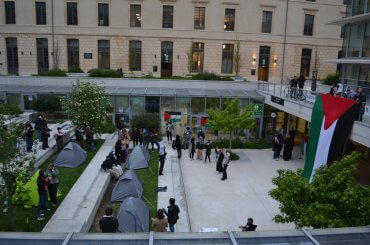 Raji Sourani of the Palestinian Center for Human Rights (Photo: The Advocacy Project/Flickr)
Raji Sourani of the Palestinian Center for Human Rights (Photo: The Advocacy Project/Flickr)
Scroll down for an update to this story–an e-mail from Raji Sourani himself on this ordeal.
Part of the goal of the Russell Tribunal on Palestine is shining a light on the abuse of Palestinian human rights by Israel. But that task becomes a lot harder when one of the prominent Palestinians scheduled to speak in New York for the fourth session of the tribunal is denied an entry visa by the U.S. government.
Raji Sourani, director of the Palestinian Center for Human Rights, was denied a U.S. visa to enter the country in order to participate in the tribunal, according to various speakers at the recently-concluded event. The Gaza-born Sourani was scheduled to speak on “the case of Gaza” as it relates to the role the United Nations plays in obstructing the self-determination of Palestinians, which was one of the themes of the tribunal.
His absence compounded one of the problems with the tribunal: the lack of diversity among speakers. Some attendees of the tribunal criticized the largely white, male speakers who gave testimony on the grim situation for Palestinians.
Sourani’s case is by no means unique. The U.S. government routinely denies visas to people whose views are outside of the mainstream. This practice is decried as “ideological exclusion” by the American Civil Liberties Union.
“Under the Bush administration, the United States government routinely denied visas to foreign nationals whose political views it government disfavored. Once used to bar suspected Communists from entering the country, the practice of ‘ideological exclusion’ was resurrected by the USA Patriot Act,” the ACLU states. “Ideological exclusion violates Americans’ First Amendment right to hear constitutionally protected speech by denying foreign scholars, artists, politicians and others entry to the U.S.”
While the ACLU applauded the Obama administration’s decision to grant visas to two Muslim scholars previously barred, the practice apparently continues. The U.S. denied a visa to Omar Barghouti, a leading boycott, divestment and sanctions (BDS) activist, in 2011. Barghouti was attempting to enter the U.S. for a book tour. After activists mobilized and pressured the State Department over the denial of Barghouti’s visa, the U.S. let up, and Barghouti was granted a visa.
Sourani had previously been denied entry to the U.S. for 11 years because of alleged links to terror organizations, as Democracy Now! reported. But in 2011 he was granted entry to the U.S. after a campaign that included former president Jimmy Carter calling for Sourani to be granted a visa. Sourani is a recepient of the Robert F. Kennedy Memorial Award for Human Rights and was deemed a “prisoner of conscience” by Amnesty International in 1985 and 1988.
Update: The headline of this post has been changed to better reflect what Sourani tells me in an e-mail.
Raji Sourani emails and says:
Thank you for your interest in details about the rejection of my visa application.
The last time I traveled to the United States on a visa was in 1999.
Since that year my visa applications were rejected.
In 2007 the rejection letter stated that I was found ineligible to receive a visa following Section 212 (a) (3) (B) of the Immigration and National Act which prohibits the issuance of a visa to anyone associated with terrorist activities.
In September 2011 I was able to travel to the U.S. after having been issued a waiver of ineligibility. This waiver was issued after several U.S. based rights organizations had pleaded for me being allowed to travel to the country.
In the third week of August 2012, my visa application was submitted, following invitations to participate in the Russel Tribunal, a conference at Columbia University, and a Conference of the National Lawyers Guild. After approximately six weeks of waiting, I was finally scheduled for a visa interview at the U.S. Consulate in Cairo. However, I was not granted a visa but instead requested to return to the Consulate after one week, with the possibility of being issued another waiver of ineligibility.
 Raji Sourani of the Palestinian Center for Human Rights (Photo: The Advocacy Project/Flickr)
Raji Sourani of the Palestinian Center for Human Rights (Photo: The Advocacy Project/Flickr)

What a pathetic, disgusting display of utter disregard for human rights and fairness by the US Government! All bow to Israel, and to everything they demand of us in return for insulting our President, getting a few billion people to hate us for perfectly justifiable reasons, endangering the security of our country and wantonly costing us the lives of our young soldiers as we send them to do Israel’s every bidding! At least our President has had the backbone to keep NetanYAHOO from getting us to attack Iran and get ourselves into another war, one that might just be the one to utterly bankrupt this country financially just as surely as we are already bankrupt morally.
One has to wonder what makes these people tick.
Engaging with moderates is how problems are solved and certainly not by radicalizing them.
Is the Zionist MO now so deeply ingrained into American thinking.
Pathetic.
Sourani’s case is by no means unique. The U.S. government routinely denies visas to people whose views are outside of the mainstream.
So, the USA turns into a 2nd Israel!? Looks like US politicians don’t lie when they say that the USA and Israel share the same values.
Palestinian activists slated to give the Palestinian case before the PCUSA GA were also denied visas.
http://www.politicaltheology.com/blog/the-politcis-of-a-general-assembly-part-3-divestment/
With all that’s going on in the world, you’d think the State Department would have better thinks to ponder and/or pursue.